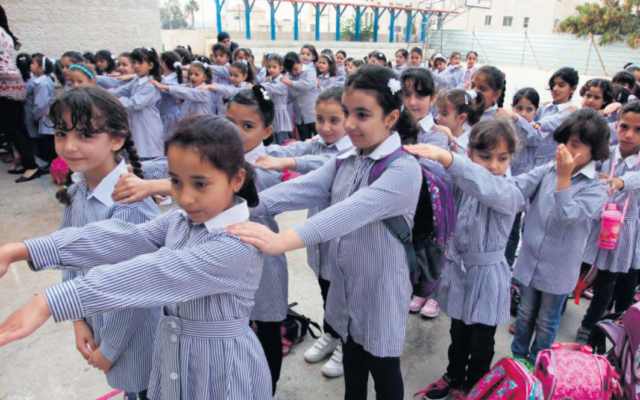Palestinian children deserve better
The truth about hatred being taught in PA schools

PLUS61J editor-in-chief Deborah Stone’s article of June 27 (in that publication) begins by erroneously claiming that IMPACT-se was brought to Australia by the ECAJ. It then repeats a slur by the Georg Eckert Institute (GEI), an institute named after a former Nazi who volunteered for Hitler’s Brownshirts, and whose credibility was brought into question by British and German media for Arabic translation errors, flawed methodologies, and researching the wrong textbooks. Parliament members demanded that the EU cease cooperation with the institute.
And that is just the first two short paragraphs.
IMPACT-se analyses education to encourage standards of peace and tolerance, and presents policy recommendations to decision-makers. IMPACT-se is quoted annually by the US State Department, other government reports, and by major media outlets around the world, and works with multiple ministries in the MENA region.
Curriculum research is too important to politicise. Textbooks are the key to fostering the development of peaceful, tolerant societies of the future; it is vital that we rely on empirical research and do not play politics with the education of children.
So bizarrely, Stone chooses to quote Nurit Peled-Elchanan, who engaged in antisemitic hate-speech about greed, deceit and child-killing, equated Zionism to ISIS, said Israeli women are more terrible than golems, and “dedicate their wombs to the apartheid state”. She refers to Alayan’s defunct research on Palestinian textbooks from over 25 years ago, and quotes Assaf David saying there is no antisemitism in Palestinian textbooks – when he writes that there is.
The EU report on PA textbooks
At the centre of the article is the EU report on the PA curriculum, which Stone asserts finds no direct incitement to violence. An interesting interpretation, given that GEI, the authors, determined the textbooks contain “examples of the glorification of violence and antisemitism”. Stone’s view is not even shared by UNRWA’s Commissioner-General, Philip Lazzarini, who acknowledged the existence of incitement to violence, antisemitism and glorification of terrorism.
Speaking in the EU Parliament, Vice President Nicola Beer of the left-wing Renew Europe party stated: “Depicting Jews as dangerous, demonising them […] is just upsetting […] I speak as a mother – glorifying terrorist Dalal al-Mughrabi, presenting cold-blooded violence against civilians, including a lot of children, as resistance, leaves me speechless.”
Stone overlooked EU Commissioner Oliver Varhelyi’s call to condition aid. Director-General Maciej Popowski wrote to the Palestinian PM “to take immediate action”.
EU Acting Director Henrike Trautmann, US Secretary of State Antony Blinken, UK, Swiss, Norwegian, Dutch, Danish ministers, the Anti-Defamation League (ADL), the Council of European Rabbis and many others expressed concern and condemnation.
The racist discourse in Palestinian textbooks was even condemned by the United Nations.
Today’s Palestinian and Israeli curricula
The article claims that IMPACT-se does not highlight problems in the Israeli curriculum. Below is some latest research on both curricula in relation to antisemitism, peacemaking, and violence:
The Palestinian curriculum teaches that Jews control the world and are corrupt; instructs students to be punished for not directly connecting Judaism with murder; that Zionists control money, media and politics; describes the fate of Israeli Jews as extermination; teaches calculus in fourth grade by counting martyrs in Palestinian uprisings; teaches that horrific terror acts like the 1972 Munich Olympics massacre are legitimate; teaches that terrorists such as Dalal Mughrabi are role models; teaches first graders to read and write with an exercise on the letter “h” (hā) using words like shahid (martyr), that Palestine’s contiguous territory is from the “river to the sea”; that women are obstacles to the success of men due to their need for “attention,”; and removed examples calling for non-violence, and those describing peace agreements.
The Israeli curriculum is not perfect – no curriculum is. But from a young age, poetry, songs and history lessons promote peace in relation to the Palestinian other, and peacemaking as a symbol of Jewishdemocratic values. Examples of peace negotiations and agreements are cited, with students taught advantageous outcomes of peacemaking. The role of Israeli–Arab citizens is highlighted through Arab– Jewish friendships, community engagements and personal interactions. The textbooks explain Palestinian national identity. Lessons address violence against Palestinian civilians by individuals, groups or the state. Such events are condemned. Examples include the Deir Yassin and Kfar Qasim killings of Arab-Israelis, acts against Arab civilians by pre-state Jewish paramilitary groups, and the murder committed by Baruch Goldstein. Israeli textbooks teach the emergence of a Palestinian national identity and Palestinian experience; first-person accounts which narrate the condition of Palestinian refugees since 1948; challenges facing Palestinians; and the poems of Mahmoud Darwish. And to again correct the article: there are inconsistencies, but most maps recognise Palestinian presence – they demarcate the Green Line, and indicate territories controlled by the Palestinian Authority.
Qatar, Saudi Arabia, Egypt, Morocco, Bahrain, Jordan, and the UAE are reforming textbooks. Meanwhile, the Palestinian leadership is radicalising 1.3 million children every school day with tragic results.
Palestinian children deserve better.
Marcus Sheff is CEO of the Institute for Monitoring Peace and Cultural Tolerance in School Education (IMPACT-se).

comments